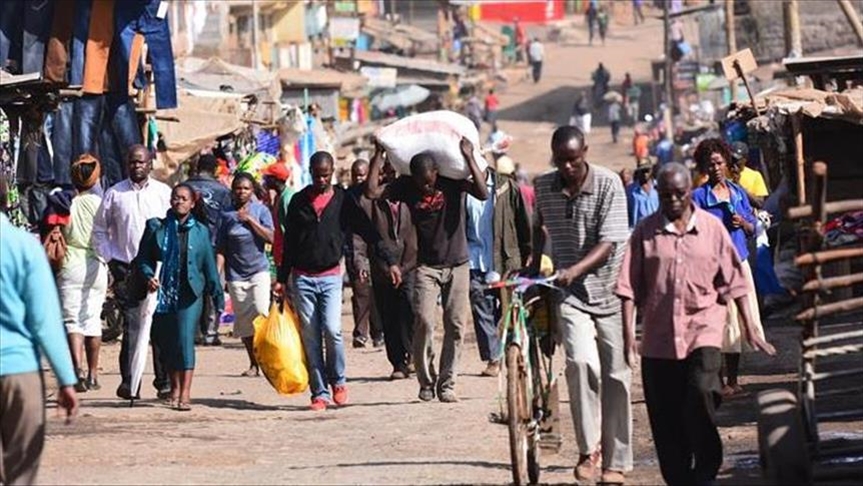
NAIROBI, Kenya
As Kenya figures among some of the gloomiest nations on Earth, the question is who are the sad people in the country?
On eve of International Day of Happiness, which is being observed on Saturday, Anadolu Agency found richer and affluent people in the East African country unhappy and currently more because of financial constraints enforced by the pandemic.
In contrast, the poorer neighborhoods exuded satisfaction and those living there said even COVID-19 has not stolen their smiles.
Last year a UN survey ranked Kenya at 121 out of 156 countries in terms of happiness. It noted that the happiness index in the East African nation was just 4.583 out of the scale of 10.
Speaking to Anadolu Agency Adam Oloo, a resident of low income Kariobangi residential estate in the capital Nairobi said he was happy with the little that he has. Sitting in his ramshackle grocery shop made up of rusted iron sheets, he wondered the tag of being gloomy attached to his countrymen.
“I am happy with the little I have because I have always had this little, I eat three times a day and have enough to cater for my family and my eight-year-old daughter. The COVID-19 has affected many people but for someone like me life is the same and has barely been affected,” he said.
He said for vendors like him and his customers as well, life is the same.
“Curfew did not affect us because by around 8 p.m. even without the pandemic we shut up. I am happy, people in my field are happy in fact with many people at home, we sell a lot of foodstuffs and barely waste anything,” he said.
Just a distance away a shopkeeper Willie Njoroge said he has no reasons to be sad.
“I am a happy person as long as my family is happy, my family is my everything, I provide for them just like before and business has overall been good, there are some shortages of products but mostly that was in 2020, in 2021 people are used to the pandemic and how they deliver products to us has changed,” he said.
At the Kariobangi flea market, Linda Isoyi who is selling fish said in these localities people help each other. Her husband is an electrician, who lost most of the clients during COVID-19, but not that much to leave the family hungry.
Gloom in richer localities
But just one cross over to the wealthy neighborhoods lined up with metallic roads and infrastructure, the gloom becomes visible.
Steven Muriuki, living in a two-bedroom apartment in an affluent Kilimani neighborhood has lost his job as the NGO, where he was working as an accountant has closed its office.
“I lost the job that I loved, it paid well. I can say since then I have not known happiness. I have moved into a tiny house paying $200 a month. I am using my savings with no further income. You guess how happy I can be,” he said.
His neighbor Faith Wambui was working as a hotel manager. She has handed over retrenchment letters to many of her colleagues.
“It makes me sad to do this. These are people who depended on these jobs. Sending them home because there is no tourism in Kenya and hotels were operating in losses is depressing,” she said.
She added that her own life has gone topsy-turvy.
Even having three meals a day now is a problem. Imagine a 30% cut in salaries and managing paying taxes and rent. I was barely surviving,” she said.
For James Omusenjeri, who imports vehicle spare parts from China and Japan, the business has come crashing down.
“With restricted movements, no one is buying car spare parts. I used to cater to rich Kenyans. I can now barely afford my rent, there is nothing to be happy about this year and last year, that is why people are committing suicide,” he said.
According to Kenya’s presidency, the economy was projected to grow by 6.2% in 2020, it only grew by only 0.6% due to COVID-19 Pandemic.
Experts explain phenomenon
Explaining the phenomenon, James Kimani, consulting psychologist told Anadolu Agency that rich in the race to earn capital forget about social life. Now with the COVID-19 related restrictions taking away jobs, that makes them more vulnerable.
“The poor, as we have seen as psychologists, will never be sad in such a situation, because they share their problems, and talk about issues affecting them,” he said.
Further, the rich will appear that they do not have any problems, while the poor will ask for help and are content even after getting a little.
Kennedy Ongaro, a sociologist and professor at the Daystar University in Nairobi said the people belonging to higher status are extremely sad because their business and jobs are not doing well to get the wealth.
“The poor and middle class relate happiness with what they have because they live a life of hand to mouth, this is why many in this class will remain happy because they appreciate what they have as long as they don’t lack anything they will always be happy,” he said.
He said the people are generally sad when they were left alone and that is what has happened during the COVID-19. The professor recommended that to get people out of the gloom is to reach out to them.
“The government should not go silent on its people and not leave them alone,” he added.
Anadolu Agency website contains only a portion of the news stories offered to subscribers in the AA News Broadcasting System (HAS), and in summarized form. Please contact us for subscription options.







